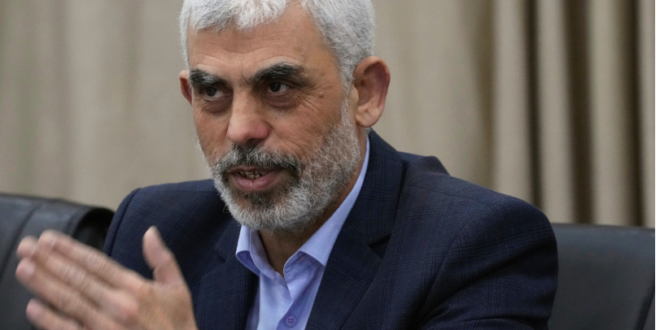Muhamad Yehia
BEIRUT (AP) — Yahya Sinwar masterminded an attack on Israel that shocked the world, unleashing a still-widening catastrophe with no end in sight.
In Gaza, no figure loomed larger in determining the war’s trajectory than the 61-year-old Hamas leader. Obsessive, disciplined and dictatorial, he was a rarely seen veteran militant who learned Hebrew over years spent in Israeli prisons and who carefully studied his enemy.
On Thursday, Israel said troops in Gaza had killed Sinwar. There was no immediate confirmation from Hamas of his death.
The secretive figure feared on both sides of the battle lines engineered the surprise Oct. 7, 2023, attack into southern Israel, along with the even more shadowy Mohammed Deif, head of Hamas’ armed wing. Israel said that it killed Deif in a July airstrike in southern Gaza that killed more than 70 Palestinians
Soon after, Hamas’ leader in exile, Ismail Haniyeh, was killed while visiting Iran in an explosion that was blamed on Israel. Sinwar was then chosen to take his place as Hamas’ top leader, though he was in hiding in Gaza.
Palestinian militants who carried out the October 2023 attack killed around 1,200 people, mostly civilians, and abducted around 250 others, catching Israel’s military and intelligence establishment off guard and shattering the image of Israeli invincibility.
Israel’s retaliation was crushing. The conflict has killed over 42,000 Palestinians, caused widespread destruction in Gaza, and left hundreds of thousands of people homeless and many on the verge of starvation
Sinwar has held indirect negotiations with Israel to try to end the war. One of his goals was to win the release of thousands of Palestinians held in Israeli jails, much like the deal that got him released more than a decade ago.
He worked on bringing Hamas closer to Iran and its other allies across the region. The war he ignited drew in Hezbollah, eventually leading to another Israeli invasion of Lebanon, and led Iran and Israel to trade fire directly for the first time, raising fears of an even more expansive conflict
To Israelis, Sinwar was a nightmarish figure. The Israeli army’s chief spokesperson, Rear Adm. Daniel Hagari, called him a murderer “who proved to the whole world that Hamas is worse than ISIS,” referring to the Islamic State group.
Always defiant, Sinwar ended one of his few public speeches by inviting Israel to assassinate him, proclaiming in Gaza, “I will walk back home after this meeting.” He then did so, shaking hands and taking selfies with people in the streets.
Among Palestinians, he was respected for standing up to Israel and remaining in impoverished Gaza, in contrast to other Hamas leaders living more comfortably abroad.
But he was also deeply feared for his iron grip in Gaza, where public dissent is suppressed.
In contrast to the media-friendly personas cultivated by some of Hamas’ political leadership, Sinwar never sought to build a public image. He was known as the “Butcher of Khan Younis” for his brutal approach to Palestinians suspected of collaborating with Israel
Sinwar was born in 1962 in Gaza’s Khan Younis refugee camp to a family that was among hundreds of thousands of Palestinians driven from what is now Israel during the 1948 war surrounding its creation.
He was an early member of Hamas, which emerged from the Palestinian branch of the Muslim Brotherhood in 1987, when the coastal enclave was under Israeli military occupation.
Sinwar convinced the group’s founder, Sheikh Ahmed Yassin, that to succeed as a resistance organization, Hamas needed to be purged of informants for Israel. They founded a security arm, then known as Majd, which Sinwar led.
 موقع وجه أفريقيا موقع وجه أفريقيا هو موقع مهتم بمتابعة التطورات في القارة الأفريقية
موقع وجه أفريقيا موقع وجه أفريقيا هو موقع مهتم بمتابعة التطورات في القارة الأفريقية



